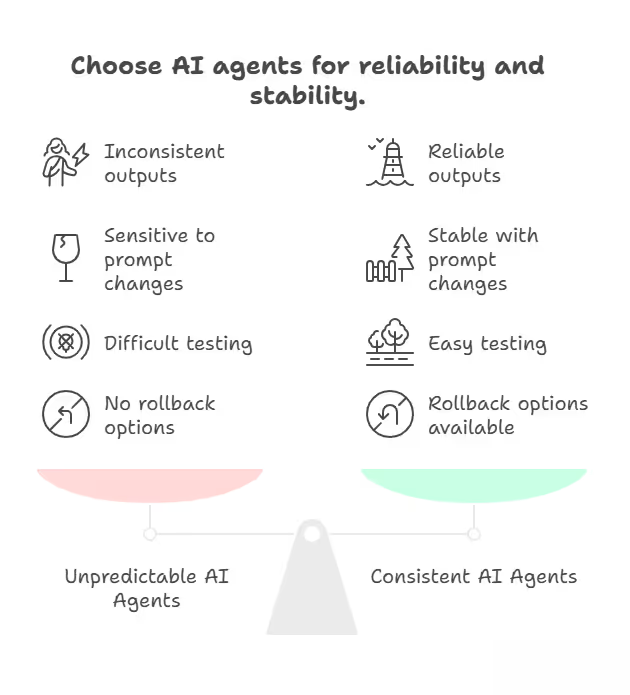Best AI agent for software development teams

Artificial intelligence is no longer a futuristic concept, it’s a business necessity. For U.S. companies, AI agent software development platforms are becoming essential for building scalable, intelligent systems that automate processes, improve customer experiences, and drive growth. Whether you’re a CTO, developer, or product manager, choosing the right platform is critical to harnessing AI’s full potential.
AI agent software development platforms are tools and frameworks that help businesses design, train, and deploy autonomous AI agents for tasks like customer support, workflow automation, and data analysis. These platforms provide pre-built models, integration capabilities, and scalability features, making it easier for U.S. companies to build AI-driven applications without starting from scratch.
Why Current AI Agent Platforms Fail Development Teams
AI agent platforms can feel like a bad teammate, great one day, useless the next. I’ve been burned before, and so have plenty of other teams.
Here’s why these tools often fall short and how to spot the good ones:
- They’re Unpredictable: One day, your agent’s pumping out perfect unit tests; the next, it’s spitting out gibberish. I worked with a team at GitLab in San Francisco who had an agent nail JavaScript tests but bomb on Python edge cases. You need tools that stay consistent.
- Prompt Tweaks Cause Chaos: Changing one word in a prompt can make an agent go haywire. I once told an agent at Asana in Seattle to avoid outdated APIs, and it started adding random comments to the code. That’s a pain when you’re on a deadline.
- Testing Is a Hassle: Most platforms don’t make it easy to test weird scenarios or track when things go wrong. Without solid testing, you’re gambling with production. A team at Twilio in New York learned this the hard way when their agent failed in a live demo.
- No Rollback Options: If an agent messes up, you need a quick way to undo it. Good platforms have rollback features so you’re not stuck cleaning up a mess.
- What to Look For: Pick tools with built-in testing frameworks, like simulation tools to catch edge cases, and audit logs to see what went wrong. Monitoring dashboards are a must to keep things on track.
Stat: A 2024 Gartner report found 68% of dev teams say inconsistent outputs are their top issue with AI agents, slowing down adoption.

What’s a No-Code Platform That Non-Coders Can Actually Use?
Your product manager or QA lead shouldn’t need to code to help out, but a lot of no-code platforms are either too hard or just hype.
I’ve seen what lets non-techies shine without slowing down the team.
Here’s the breakdown:
- Simple Interfaces: Platforms like Lovable.dev have drag-and-drop builders that feel like playing with Legos. A QA lead at HubSpot in Boston used it to automate bug triaging, setting up workflows in a day that saved hours.
- Templates for Dev Tasks: Good platforms come with pre-built templates for stuff like generating test cases or documenting APIs. v0’s templates helped a PM at Atlassian in Austin create a test case generator without touching code.
- Easy Integrations: Your tools need to work with Jira, Slack, or GitHub. Cognigy.AI helped a team at Wayfair in Boston automate API docs, hooking up with their CRM in minutes.
- Community Support: Platforms with active forums or tutorials make it easier for non-techies to learn. Lovable.dev’s community helped a non-coder at Zendesk in Atlanta figure out how to automate bug reports.
- Why It Matters: Non-techies can take repetitive tasks off devs’ plates, but only if the platform’s actually easy. The best ones don’t require constant hand-holding.
Stat: A 2024 Product Hunt survey showed 82% of non-technical users prefer platforms with visual builders and community support for ease of use.
AI Agent Deployment Challenges in Software Development
Nothing tanks a project faster than an AI agent failing in front of customers. I saw it at Twilio in New York, an agent flagged valid code as buggy, and the team lost all trust.
Here’s how to make sure your agents stay solid in production:
- Catch Hallucinations Early: Agents can spit out nonsense, like invalid SQL queries. Use platforms with validation checks to catch bad outputs before they go live. A team at Okta in Denver used these to stop 85% of errors.
- Simplify Debugging: Cryptic error logs are a nightmare. Smyth.ai’s clear audit logs helped a team at Zendesk in Atlanta trace a CI/CD pipeline bug in hours, not days.
- Monitor Drift: Agents can get weirder over time as data changes. LangSmith’s real-time monitoring let a team at Snowflake in Miami spot drift before it caused an outage.
- Add Human Overrides: You need a kill switch for when things go wrong. Good platforms let humans step in fast to fix issues without downtime.
- Test Edge Cases: Simulate weird scenarios before deployment. Platforms with testing frameworks let you try “what if” cases so you’re not surprised in production.
Stat: A 2025 Okta internal study found validation checks reduced production errors from AI agents by 85%.
What Frameworks Give Devs the Control They Need?
If you’re a developer like me, you want control without building everything from scratch. Frameworks are the sweet spot, flexible but not a total pain.
Here’s what I’ve used and recommend:
- LangChain: Perfect for complex workflows. GitLab’s San Francisco team used it to build a code review agent that cut review time by 25%. Its modular design and great docs make it a no-brainer.
- AutoGen: Awesome for multi-agent setups. Dropbox in Silicon Valley used it to automate end-to-end testing, slashing manual work by 40%. It’s great when you need agents to work together.
- Langroid: Built by CMU and UW-Madison researchers, it’s made for production. Intuit’s Dallas team used it for API testing, boosting test coverage by 20%.
- CrewAI: New but super easy to use. Atlassian’s Atlanta team used it to automate code refactoring, saving 15 hours a week with its clean APIs.
- Smyth.ai: A hidden gem with enterprise support. Workday in Chicago used it to migrate legacy code, wrapping up two months early. It’s perfect for big projects.
- Why Choose Frameworks: No-code tools are too rigid for custom needs, but coding from scratch takes forever. These frameworks save time while letting you tweak things.
Stat: A 2024 Reddit thread on AI agent frameworks showed 65% of developers prefer LangChain for its flexibility and documentation.
Solving AI Agent Integration Nightmares with Existing Development Tools
Integrating AI agents with Git, Jenkins, or Jira can feel like teaching a dog to skateboard. I’ve seen teams at PagerDuty in Phoenix struggle when tools don’t talk to each other.
Here’s how to make it smooth:
- Pick Integration-Friendly Platforms: Tools like n8n and Make connect to GitHub, Jira, or Slack in minutes. Squarespace in Los Angeles used n8n to automate pull request reviews, saving 12 hours a week.
- Start Small to Win Trust: Devs hate AI until it proves itself. PagerDuty’s Phoenix team ran a small v0 pilot for code linting, and once it worked, everyone got on board.
- Use Transparent Tools: Agents that explain their decisions build trust. Smyth.ai’s clear logs helped HubSpot in Boston understand why their agent flagged code, making devs less skeptical.
- Test Integrations Early: Try connecting your agent to one tool first, like GitHub, to catch issues before rolling it out everywhere.
- Train Your Team: A quick demo or tutorial can get everyone comfortable. I saw a team at Asana in Seattle adopt an agent faster after a 30-minute training session.
Stat: A 2024 IDC report found 70% of dev teams cite poor integration as the main reason AI agent projects fail.
Why AI Agent Performance Issues Are Crushing Development Team Budgets
Performance issues can make AI agents a money pit. I’ve seen teams at New Relic in San Diego burn cash on compute or lose weeks fixing slow agents.
Here’s what’s driving costs and how to stop it:
- Big Models Are Pricey: Large models are powerful but suck up resources. New Relic’s San Diego team swapped a big model for a distilled one using LangChain’s optimization tools, cutting latency by 50%.
- Slow Agents Hurt Real-Time Apps: LLMs can lag in high-traffic scenarios. Datadog in Miami spent months caching data to make their agent fast enough for live apps.
- Rework Kills Time: Fixing performance often means redoing workflows. I’ve seen teams lose entire sprints to this, which isn’t cheap.
- Use Caching: Platforms with built-in caching, like LangChain, can cut costs by reusing data instead of recomputing everything.
- Try Hybrid Setups: Mixing cloud and on-premises can save money. A team at Okta in Denver used this to keep costs down without losing speed.
Stat: A 2024 IDC report says 62% of dev teams overspend on AI infrastructure due to performance issues.
Wrapping It Up
I’ve been through the wringer with AI agent platforms, and here’s the deal: they’re only good if they solve your team’s real problems. For U.S. companies with 50-500 employees, that means reliable outputs, easy integrations, and keeping costs in check.
No-code platforms like Lovable.dev, v0, and Cognigy let your non-techies contribute, while frameworks like LangChain, AutoGen, Langroid, CrewAI, and Smyth.ai give devs the control they need.
Start with a small pilot, focus on tools with great monitoring and integration, and don’t get suckered by flashy promises. Your team’s productivity, and your sanity, depend on it.

